|
|
Waves Manny Marroquin Signature Series
|
|
|
The Waves Audio Manny Marroquin Signature Series Collection is their latest bundle of custom plug-ins developed in collaboration with renowned mixing engineer Manny Marroquin (Bruno Mars, Alicia Keys, Rihanna, Maroon 5, Shakira). These are six hybrid plug-in tools that distill a lot of Manny's mixing style, aesthetic and process that he's developed over his continuing and storied career.
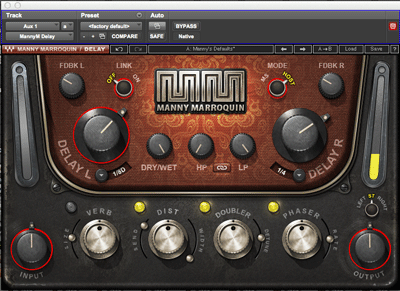
Manny Marroquin Delay
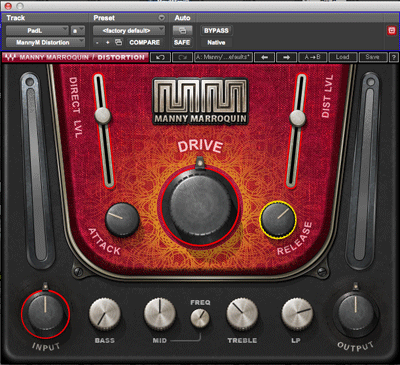
Manny Marroquin Distortion
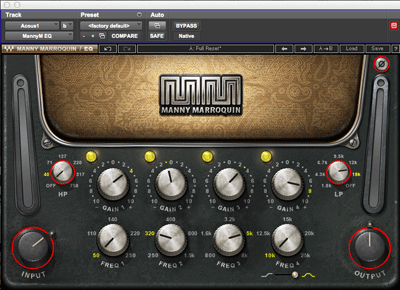
Manny Marroquin EQ
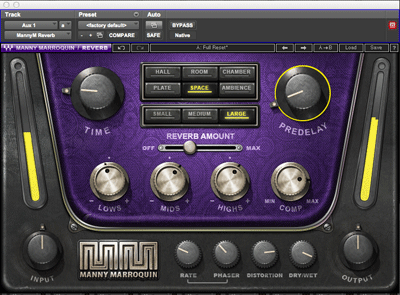
Manny Marroquin Reverb
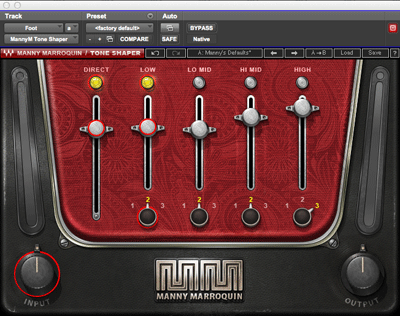
Manny Marroquin Tone Shaper
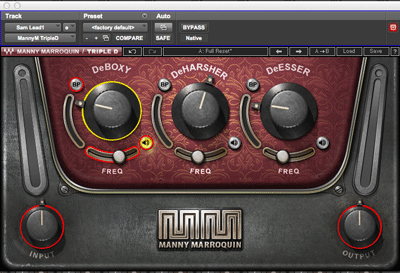
Manny Marroquin Triple D
The Manny Marroquin Signature Series are: Delay, Distortion, EQ, Reverb, Tone Shaper, and Triple D. The Manny Marroquin Signature Series is available in all Native plug-in formats including the new AAX 64-bit for use in Pro Tools 11 HD--the DAW I used for this review. First up is my favorite, the Manny Marroquin Delay.
Manny's Delay is actually several processors arranged in a very useful way. It starts with two delay lines with input/output and feedback controls, stereo linking and HP/LP filters on the output of the delay lines only. There is also an inversely linked mode for the HP/LP filter that, when selected, locks in the relative settings of the LP and HP knobs and inversely changes them when turn either control. This creates a simultaneous opening and closing filter effect that's awesome.
You can sync to session tempo with selectable timings from 1/64T to whole notes and whether you'd like to link channel settings together or not. You can go off the grid in MS mode (up to 2,000 milliseconds) and set or type in any desired delay time(s) for each output--after that, the fun starts.
There are four more internal processors available running in parallel--post the delay lines and HP/LP filter to 'color' the delay's sound--I usually 'personalize' delay effects to the mix and song with other plug-ins either in serial chains or as separate sends/returns (parallel) but here some of that tweaky configuration is done for you. I like that I could audition any of these additional processors with individual lighted bypass buttons and set their individual mix level (or contribution) to the total effect output.
Manny's Delay has a Reverb section, with a Size control, that adds reverb post the delayed signal. The Distortion section, with its own Send control, 'blows up'--distorts the delay output and the Width fader adds extra stereo width only on the distortion components. I found this feature to pseudo-randomize the left and right output's coloration--a subtle effect and I like subtle.
The Doubler section randomizes the pitch center of the delay outputs with large amounts of Detune. I found this feature, when used lightly, blends in and smoothens the delay--especially for lead vocals and backing vocals. Lastly, Phaser adds a watery phasing effect to the delay and I like this for making long, timed delays (1/8, 1/4, 1/2-note lengths) more ambiguous and mysterious. Again awesome!
Next, Manny Marroquin's Distortion plug-in can be used either inline or in parallel. It has adjustable Input and Output level controls, Direct and Distortion mix knobs plus a separate Drive control. This is a very easy to use distortion plug with both Attack (0.1 to 500MS) and Release (5-5,000MS) controls to set the onset and release times of break up. (Think the time constant controls on a compressor) It also has a three-band equalizer with parametric mid-range and a low pass filter. I found certain combinations of bass boost and attack timing will add a percussion edge to acoustic guitars that are just too clean and lack-luster when mixed within the track. I do wish there was a bypass switch for the EQ and low pass filter sections.
The Manny Marroquin EQ plug-in is a brilliant idea and is my second favorite of the bundle! This four-band equalizer models and uses combinations of the cutoff frequencies used by equalizers from: SSL 9080 XL K (parametric LP/HP sections), Quad 8, Neve 1073, Motown, API 550B and the Avalon 2055 outboard EQ. Frequencies are selectable and familiar to anyone who has used the associated hardware units. This is a very musical processor with overlapping sections that works for any source. Overall, the sound is smooth and musical--of note is that there is no Q control for any of the sections here except for a peak/shelf switch for the high frequencies.
The Manny Marroquin Reverb is a convolution reverb that models 18 of Manny's favorite reverbs: that's six different reverbs, with small, medium, and large size choices for each. There is also a basic three-band EQ, single knob compressor post the reverb section and a phaser with rate control followed by a distortion section. I had endless fun with hours of combining different amounts of these processors like spices for a sonic stew.
A notably effect possible with this plug is creating unusual reverb tails that ring out as long as you'd like. I liked using the Space and Room patches with Pre-delay (up to 500MS) and Distortion/Compressor controls set near max for interesting reverb tails on guitars, keyboards and backing vocals. I found Manny's Reverb plug-in a great tool to experiment easily for an instrument or vocal part that "cries" for some effect treatment. Chances are I'll soon find a cool ambience or distorted plate sound that'll work great without stringing a lot of plugs together. I especially like having all the controls and power for of this effect in front of me and in one plug-in GUI.
Manny's Tone Shaper has four parallel compressors split into four separate linear phase EQ bands--the stereo version adds a Width control. You can mix the original signal along with various amounts of compression just by moving faders the Low, Lo Mid, Hi Mid and High faders up and down. I like that no numbers or frequencies are indicated and the individual bypass buttons over each fader helps makes building better sounds.
Tone Shaper is an amazing plug for kicks, snares and toms--a real character builder. Tone Shaper will instantly make any individual track stand out without a huge change in level--a jump with no bump! I love it!
Triple D, so named for DeBoxy, DeHarsher and DeEsser modules connected in that chain order and all contained in one plug-in--it ranks in my top three Manny plugs. No music mixer likes to "fix" problems with the recordings they are asked to make stellar sounding and Triple D makes that "trench" work goes faster, more precise and a little less tweaky.
This plug-in has three sections each with separate bypass buttons and a "listen" button to audition and set the Freq slider to the frequency center of interest. After that, it is just setting how much with the large Threshold control knob while viewing each section's gain reduction meter. I think of Triple D as a three-band dynamic equalizer that applies up to 12dB of compression on each band based upon on the relative energy level of those frequencies present in the source audio.
The DeBoxy section focus on the frequencies from 200Hz to 1kHz--where excessive amounts of those frequencies (for many different reasons) tend to make vocals, acoustic guitars or drums sound too "box-like" and less than tall sounding and full-range as they could be. This section can act also as a simple compressor when you crank the Threshold up. I liked it for an upright string bass when I wanted to keep the transients intact with around 10dB of gain reduction otherwise.
The DeHarsher section processes frequencies between 1.2 and 3kHz--an area where an incorrect vocal microphone choice for certain singers can exacerbate their tendency to be harsh sounding. DeHarsher is a good mellower for vocal tracks that I would normally have to employ many breakpoint fader and plug-in automation changes to end up with about the same results--definitely a big time saver for mixers!
DeEsser looks at the problematic sibilant frequencies from 3.5kHz to 12kHz. DeEsser works very effectively for a single frequency band de-esser but some singers have multiple S issues at different specific frequencies. I would not mind if DeHarsher's frequency range overlapped a little more into DeEsser's range for that reason. In addition, it would be cool if the gain reduction meter worked the same whether in normal or listen modes.
I think the Waves Manny Marroquin Signature Series Collection is a well-thought out set of processors and big winner! They are all now part of my mix process in Pro Tools 11--I used them in every mix these days!
The Waves Manny Marroquin Signature Series Collection is now available with U.S. MSRP: $500. Introductory price: $299. Visit: www.waves.com/content.aspx?id=12132 for more information.
|
|
|